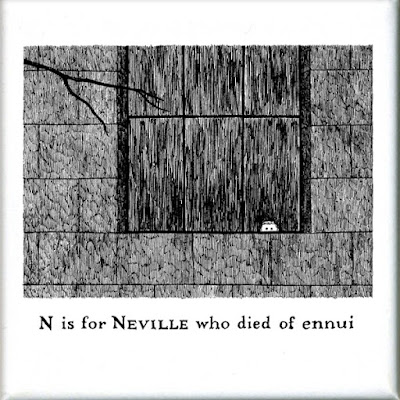"The only horrible thing in the world is ennui, Dorian. That is the one sin for which there is no forgiveness."Ennui: what word better captures that particular existential trauma of the French, and of disenchanted idealists everywhere? A people known for their melancholia and their self-doubt, the French also gave us the words "blasé," "melancholy," and "chagrin." However, while these words have been fully assimilated into mainstream English, ennui remains a stubbornly French concept. There is no English equivalent, and, when borrowed by English writers, it still has an unavoidably French flavor.
~The Picture of Dorian Gray, by Oscar Wilde
Ennui is untranslatable not only because the concept doesn't really carry over in English, but because, in French, ennui actually has a very wide variety of uses, ranging from the banal to the dramatic. It can be translated into English as "boredom," "problem," or "difficulty," and can be applied to all sorts of everyday situations.
Avoir des ennuis de voiture means "to have car trouble," while avoir des ennuis d'argent means "to have money problems."
Used as a verb, the phrase Je m'ennuie means simply, "I'm bored," and the French, like the English, can talk about "dying of boredom": mourir d'ennui.
But when it comes to the darker, more singularly French concept of ennui, my favorite online dictionary, Mediadico, describes it as follows:
Etat de découragement et de langueur. / State of discouragement and lethargy.
Contrariété, tracas, chagrin, tourment./ Vexation, trouble/difficulty, grief/heartache, torment.
Dégoût de tout. / Disgust with everything.
Or in LaRousse:
Lassitude morale, impression de vide engendrant la mélancolie, produites par le désœuvrement, le manque d'intérêt, la monotonie.
Translation: Moral weariness or impression of emptiness causing melancholy, and produced by idleness, lack of interest, or monotony.
Wow. I think we can safely say that there is no single word in English that is quite so...depressing. Perhaps "world-weariness" is the closest thing we have, but even that concept requires two words in English. It's no wonder that English authors like to borrow it--even if the infrequent and limited-to-literary use of ennui makes it far less impressive in English.
But sometimes they still manage to get the idea across. My favorite example is probably from Edward Gorey's infamous alphabet book, The Gashlycrumb Tinies. No English word was strong enough to describe the cause of poor little Neville's demise.
But it's in French literature where you really see the full bloom and depth of ennui. French writers love this word. In one excellent article, called "Bleak chic," the Economist wrote "the left-bank literary clique led by Sartre and Simone de Beauvoir, [...] adopted ennui as a way of life as well as a philosophy."
Long before that, in the poem "Those Who Live Are Those Who Struggle," Victor Hugo wrote:
Car de son vague ennui le néant les enivre,
Car le plus lourd fardeau, c'est d'exister sans vivre.
Because, with its vague ennui, the nothingness intoxicates them,But of course, nobody captures the extremes of this word better than Charles Baudelaire--and who knows, perhaps he contributed to the force of its meaning. After all, Les Fleurs du Mal is probably the most famous book of French poetry from the 19th century. He starts it right off with a poem "To the Reader," which concludes:
Because the heaviest burden is to exist without living.
Mais parmi les chacals, les panthères, les lices,Translated:
Les singes, les scorpions, les vautours, les serpents,
Les monstres glapissants, hurlants, grognants, rampants,
Dans la ménagerie infâme de nos vices,
II en est un plus laid, plus méchant, plus immonde!
Quoiqu'il ne pousse ni grands gestes ni grands cris,
Il ferait volontiers de la terre un débris
Et dans un bâillement avalerait le monde;
C'est l'Ennui! L'oeil chargé d'un pleur involontaire,
II rêve d'échafauds en fumant son houka.
Tu le connais, lecteur, ce monstre délicat,
— Hypocrite lecteur, — mon semblable, — mon frère!
But among the jackals, the panthers, the bitch hounds,
The apes, the scorpions, the vultures, the serpents,
The yelping, howling, growling, crawling monsters,
In the filthy menagerie of our vices,
There is one more ugly, more wicked, more vile!
Although he makes neither great gestures nor great cries,
He would willingly make of the earth a wreck
And, in a yawn, swallow the world;
It is Ennui! — With an unwilling tear in his eye,
He dreams of scaffolds as he smokes his hookah.
You know him, reader, that delicate monster,
— Hypocritical reader, — my fellow, — my brother!

No comments:
Post a Comment